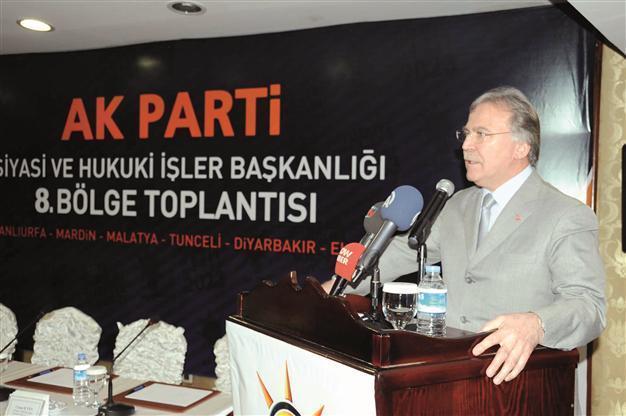Hopes fade for charter consensus
ANKARA - Hürriyet Daily News

AKP deputy chair Mehmet Ali Şahin has joined politicians who have stated that the hopes of drafting a new Constitution from scratch are fading away. DHA photo
President Abdullah Gül’s expression of hopelessness over Turkey’s much-anticipated parliamentary work to write a brand-new Constitution has led to varying reactions from ruling and opposition parties, with two opposition parties accusing the president of intervening in the will of Parliament.
Talking to a group of journalists traveling with him to Portugal for a state visit at the invitation of Portuguese President Anibal Cavaco Silva, Gül said May 6 that only amendments to the current Constitution would be possible in this legislative term.
According to the ruling Justice and Development Party (AKP), what Gül said could for now be considered only one of the possible options. However, support for Gül’s statement came from within the Peace and Democracy Party (BDP), which said Parliament’s Constitution Conciliation Commission had been unable to efficiently use its time thus far.
“I believe Gül is right and that the commission has not been able to efficiently use the time it has been offered. Intentions matter here; if there is will to do so, then it could be sorted out, even within a month,” BDP co-leader Gültan Kışanak told a small group of journalists on May 7, underlining that conditions in the country were ripe for the writing of a new Constitution. She argued that politicians languished behind the people’s will, as they only prioritized their electoral concerns.
Supportive of Gül’s remarks, while critical of the timing, AKP deputy chair Mehmet Ali Şahin agreed that the hopes of drafting a new Constitution from scratch were fading but that partial amendments were still relevant.
“Our president’s suggestion could only be one of the possibilities to come to mind if a conciliation text does not emerge from there. We are quite far from that point; we are not there,” Şahin said.
But Republican People’s Party (CHP) deputy and commission member Atilla Kart hinted at the president’s pro-government bias. He also noted that the AKP’s choice on a partial amendment had been declared by the president, which indicated dangerous one-man rule.
“It means that political governance has come to the choice of a partial Constitution. This choice has been declared by Gül. It is a weakness that Gül talked about the process like a decision-maker, even though it must be clarified with parliamentary consensus. This does not comply with the responsibilities of the president,” Kart said.
Nationalist Movement Party (MHP) deputy chair Faruk Bal, a member of the commission, said the government’s insistence on the presidential system was harming its work. “The AKP’s insistence on the presidential system, as well as the BDP’s demands over federation and war reparations, are hindering the success of the commission,” Bal said.
He also dismissed Gül’s comments as biased. “We want the president to distance himself from the manner guiding the ruling party, which has embarked on a quest for partial amendments,” he said.
Kışanak, meanwhile, argued that “congestion” regarding the making of a new Constitution stemmed from the Kurdish issue.
“Therefore, if a consensus emerges from the Kurdish issue, other issues can easily be overcome,” she said.
Meanwhile, Parliament's Constitution Conciliation Commission agreed May 7 to continue to negotiate the drafting of a new charter until July 1 following a critical meeting chaired by Parliamentary Speaker Cemil Çiçek.
